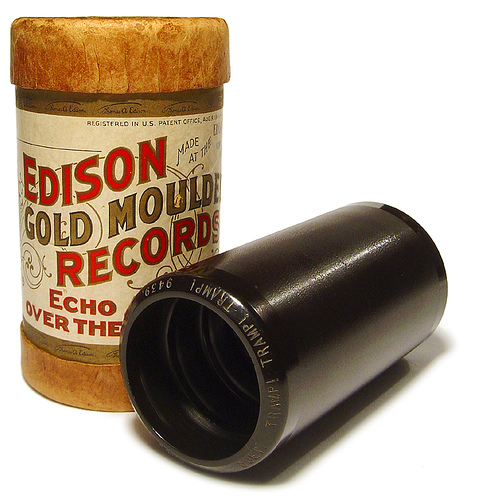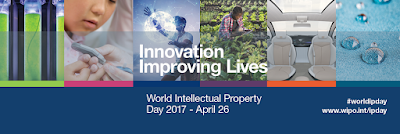Meia Geddes has created a libguide on self-publishing. Under the topic of "administrative," she includes content on copyright and Fair Use. Many new authors do not consider the impact of copyright on their work, so I'm pleased to see Geddes include it here.
Geddes, who is a published author, created this libguide as part of her MSLIS studies at Simmons. This guide is in a Springshare sandbox for LIS programs, however, she intends to keep the guide up-to-date and active so it will not just be a temporary work. Perhaps there is a natural permanent home for this effort?
Friday, April 28, 2017
Wednesday, April 26, 2017
Spinning 3D Digitized Objects
The Everson Museum of Art in Syracuse, NY is known for its world-class ceramic collection. Items from that collection have been digitized so they are can be reviewed while rotating them. This Madonna by Waylande Desantis Gregory is a good example of the work. When they're ready, I hope they publish an article (or two) about this work because this will be of interest to many others.
Tuesday, April 25, 2017
Article: Torching the Modern-Day Library of Alexandria
This quote seems to be all anyone needs in order to be tempted to read this article:
...the idea that somewhere at Google there is a database containing 25-million books and nobody is allowed to read them. It’s like that scene at the end of the first Indiana Jones movie where they put the Ark of the Covenant back on a shelf somewhere, lost in the chaos of a vast warehouse.
Belfer Audio Archive's Sound Beat
 Syracuse University's Belfer Audio Archives has been producing Sound Beat for several years and perhaps you've heard these 90-second segments on your radio station. All of the recordings used are in the Belfer Sound Archive, from speeches to music to the sounds of nature. Each episode give a quick overview or history and a portion of the recording. It's possible to subscribe (free) the Sound Beat recordings and receive the new one each day. You can also add Sound Beat to your web site through a widget.
Syracuse University's Belfer Audio Archives has been producing Sound Beat for several years and perhaps you've heard these 90-second segments on your radio station. All of the recordings used are in the Belfer Sound Archive, from speeches to music to the sounds of nature. Each episode give a quick overview or history and a portion of the recording. It's possible to subscribe (free) the Sound Beat recordings and receive the new one each day. You can also add Sound Beat to your web site through a widget.Sound Beat makes the past available through audio. I can imagine someone wanting to connect these sound bites to other digitized content to make a media rich experience.
Monday, April 24, 2017
Music Memory Dump by Bruan Schuff
 |
| Bryan Schuff |
Bryan has been working with "sound" for a over a decade and is an audiophile, so this post was clearly about something he cares about.
Something we’ve touched on before is that there are copyrights in both the songs/music and in the sound recording. You may have noticed there are different copyright symbols to make this distinction on albums: © for the music and ℗ for the sound recordings (phonogram or phonorecord). This can lead to disputes between record labels and artists, especially when a band records an album and their label decides not to release it, or “shelve” it indefinitely. The artist rarely has much power in this situation when they're "held hostage," but some have found other ways to get their music out, usually by self-distributing the album for free (especially online now), by purchasing the master tapes, or by re-recording the material with a new label. I think the key in these examples is that the record label wasn’t making money off of the material, anyway, so if the artists released it for free, then no monetary harm was done.
My favorite band, The Smashing Pumpkins, recorded enough material for two discs on their last (formative) album, MACHINA/the Machines of God, but because their previous album underperformed on the charts, their label Virgin Records rejected that idea and opted for a single-disc record. Band leader Billy Corgan announced the Pumpkins’ break-up shortly before releasing MACHINA, then proceeded to leak a few bootlegs to fans throughout the year leading up to their last show. This culminated with cutting 25 copies of a double LP and triple EP collection (25 songs total) on vinyl for those lucky people to distribute to fans. Radiohead often gets credit for being the first to release an album for free, but the Pumpkins did this in 2000, and their fans had to transfer the songs from vinyl records and burn them to CD-Rs or upload them online at the dawn of high-speed internet. Interestingly, Virgin Records included a few of these songs on the Pumpkins’ Greatest Hits compilation bonus disc the following year (though they were likely high-quality transfers from the vinyl records, not from the master tapes). The Pumpkins began remastering and reissuing their entire catalog in 2011 (after their material was no longer covered by their contract with Virgin), but that came to an abrupt halt after 2014 when the next album to receive this treatment was MACHINA; there has been a dearth of news regarding when this might continue.
Java Records, a subsidiary of Capitol, pulled the rug out from under Splashdown before releasing their major-label debut, Blueshift, so the band burned CDs for members of their mailing list and encouraged fans to share MP3s online; one of the band members has since also made the multi-track audio stems from two songs available for remixing. Aimee Mann purchased the master tapes from her record label so that she could release Bachelor No. 2 on her own, which got a lot of positive hype with the success of the movie Magnolia, for which about half of the soundtrack is comprised of songs from Bachelor. I recall hearing or reading about instances where bands re-recorded an entire album with a new label after their former label shelved it, but I can’t recall or find specific examples of this; I do know the Smashing Pumpkins re-recorded two songs for their major-label debut, Gish, that were previously recorded for singles on independent labels.
Our fellow LIS classmate Pat reminded me of the prolific mash-up artist Girl Talk, who has made a successful living recording and touring to support albums that consist almost entirely of other artists’ works, but he seems to know what lines to not cross. This webpage breaks down the sources of Girl Talk's material for one of his albums, which is quite extensive! One who was not as (legally) successful with his mash-up was DJ Danger Mouse, who used source material made available by Jay-Z and he got the blessing from surviving Beatles, Paul and Ringo, but not from EMI, when he mashed up The Black Album and The White Album to create The Grey Album. Perhaps the major issue here is that Danger Mouse focused on only two works by using substantial portions of The White Album in order to create the new work. The Grey Album was heavily pirated in a campaign dubbed “Grey Tuesday,” and it’s now available on the Internet Archive. In a similar fashion, Panzah Zandahz remixed and mashed up Radiohead on an album called Me & THIS Army, which is available for free (or donation) on Bandcamp; I’m not sure how Radiohead or their former label feel about this, but since the material is still online, there must not have been a DMCA takedown notice issued.
I hope these examples help shed some more light on how copyright can tangle up artists and record labels.
It's about librarianship - #WhyImarch #MarchForScience
On April 22, there were hundreds of marches and rallies across the United States and on other continents to support science. Numerous photos and videos have been posted on social media, as well as news articles about the events. The signs were creative and often science inspired like the one at the right. ("If you're not part of the solution, you're part of the precipitate.")
In Syracuse, students surveyed the crowd on why people were there. My reason - the word "science" is part of the degree I hold. I have a Masters in Library Science (MLS). While I have a colleague who argues that librarianship is a design profession, she too acknowledges that librarianship is a branch of knowledge based on facts and principles. Science.
Without science, the reason this blog was created would not exist (digitization). Without science, the Internet would not exist, nor the devices you use to read the blog. Science matters.
Whether you marched or not, I hope you're keep in mind the importance of science. Perhaps take a moment to point out the things you do each day that exist because of science. And when you can, please support the continuation of science in all its forms.
In Syracuse, students surveyed the crowd on why people were there. My reason - the word "science" is part of the degree I hold. I have a Masters in Library Science (MLS). While I have a colleague who argues that librarianship is a design profession, she too acknowledges that librarianship is a branch of knowledge based on facts and principles. Science.
Without science, the reason this blog was created would not exist (digitization). Without science, the Internet would not exist, nor the devices you use to read the blog. Science matters.
Whether you marched or not, I hope you're keep in mind the importance of science. Perhaps take a moment to point out the things you do each day that exist because of science. And when you can, please support the continuation of science in all its forms.
Thursday, April 20, 2017
Have you thought about subscribing to Digitization 101 through email?
I rarely promote that you can subscribe to Digitization 101. So this is a gentle reminder that you can receive Digitization 101 blog posts via email (form below) or through an RSS reader. Both options are available to you on the right side of the blog. No unwanted messages, just blog posts from Digitization 101. Try it...you can unsubscribe at any time.
Wednesday, April 19, 2017
St. Joseph's University Copyright Information Center
Graduate MSLIS students this spring noted several excellent copyright information centers on university campuses and one of them is at St. Joseph's University in Philadelphia, PA. The SJU Copyright Information Center web site contains five main sections:
The site is part of the Academic Technology and Distributed Learning department. I think placing the Copyright Information Center within a department which deals with distributed learning shows their concern for complying with the TEACH Act. It places copyright as something faculty need to be concerned with, and I like that.
- Copyright Law
- SJU Copyright Policy
- Obtaining Copyright Permission
- Copyright Clearance Center
- Copyright Resources
The site is part of the Academic Technology and Distributed Learning department. I think placing the Copyright Information Center within a department which deals with distributed learning shows their concern for complying with the TEACH Act. It places copyright as something faculty need to be concerned with, and I like that.
Monday, April 17, 2017
Following the Potential Changes to the U.S. Copyright Office
Since fall 2016, there have changes to the U.S. Copyright Office leadership as well as additional changes that have been proposed. One place that is following those changes is the Copyright Clearance Center podcast, Beyond the Book. CCC's Christopher Kenneally and Publisher Weekly's Andrew Albanese talk weekly and those conversations frequently include information on the proposed changes to the Copyright Office. Albanese is clearly knowledge on the subject - and with good sources - which makes the 10-15 minute podcasts interesting and informative. You can subscribe to the podcasts and then listen to them on your mobile device.
Monday, April 10, 2017
LIS Conferences and Their Attendance
 I like "watching" LIS conferences both up-close and from afar. One of the things I take note of is attendance. While some are growing (e.g., the Charleston Conference), some have had recent attendance challenges (e.g., ALA, SLA and CIL). Many people have pondered why.
I like "watching" LIS conferences both up-close and from afar. One of the things I take note of is attendance. While some are growing (e.g., the Charleston Conference), some have had recent attendance challenges (e.g., ALA, SLA and CIL). Many people have pondered why.I began going to LIS conferences in the heyday of the 1990s, when people, organizations, and vendors spent more on them. There were also fewer conferences. Now people have a wider variety of mainstream and non-traditional professional development events, which they can attend in person or virtually. Social media assures that anyone can dip a toe into a conference, without being there. And with tighter budgets, we are all being more selective about which conference/event to attend. More information professionals/library staff split among a growing number of events. Mathematically you can see how a conference would have lower attendance.
We need to stop pondering why our conferences aren't attracting as many people as we'd like, and begin acting on what we know about the situation. Perhaps some conferences need to be revamped. Maybe it is time for some to end or to merge with another event. We likely need to rethink their purpose (which may include providing necessary operational funds for an association) and their budgets, and consider what benefit we really want these events to deliver. We need to stop holding onto what that conference has been and allow it to morph into what it should be now.
And we need to do this SOON.
Nota Bene: Because I have kept track of this for several years, I asked a colleague to get this info for me. This year, the attendance at the Computers in Libraries Conference was about 10% less than 2016. According to what I heard from day 1 of the conference, attendance was 1307 including exhibit only participants (1069 without) and would probably reach 1500 with onside registrants. Participants came from 44 states, the District of Columbia, and Puerto Rico. as well as 16 countries outside the U.S. The number of international participants was done. Some of that may have been due to the current political climate.
Subscribe to:
Posts (Atom)



